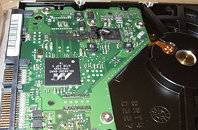Thursday, December 27th 2012
Marvell Ordered to Pay $1.17 Billion in Damages to University for Patent Infringment
Storage and application processor maker Marvell Technology has been ordered by a Federal Jury in the US state of Pennsylvania to pay a local university $1.17 billion in damages for patent-infringement. Carnegie Mellon University (CMU) developed and patented a technology that "increases the accuracy with which hard disk drive circuits read data from high-speed magnetic disks," which Marvell has been found to be infringing. Why $1.17 billion? Because these chips are an indispensable component in modern mechanical hard disk drives, made by both Seagate and WD, among others.
If and when US District Court Judge Nora Barry Fischer agrees with the Jury ruling that Marvell's infringements of CMU's patents are "willful," the fine could triple, according to K&L Gates. The jury found that Marvell sold "billions" of chips carrying the University's technology. What makes this verdict important for the PC industry is that since Marvell's HDD components are widely incorporated in HDDs across various brands, should CMU seek a sales-ban, it could potentially affect HDD production the way last year's unfortunate floods in Thailand did.
Sources:
CNN, arstechnica, The Register
If and when US District Court Judge Nora Barry Fischer agrees with the Jury ruling that Marvell's infringements of CMU's patents are "willful," the fine could triple, according to K&L Gates. The jury found that Marvell sold "billions" of chips carrying the University's technology. What makes this verdict important for the PC industry is that since Marvell's HDD components are widely incorporated in HDDs across various brands, should CMU seek a sales-ban, it could potentially affect HDD production the way last year's unfortunate floods in Thailand did.

24 Comments on Marvell Ordered to Pay $1.17 Billion in Damages to University for Patent Infringment
Firstly, I hope prices don't rise, I use A LOT of HDD's for working n stuff so I don't want to raise prices.
It seems there is still problems as to whether or not the patent was infringed, if it was, I say good on the CMU, at the end of the day they are loosing out on the money from others using their projects. However, saying that I hope if the case stands up that CMU and Marvell reach a settlement inc royalties on the products rather than a complete sales ban on the item.
That being said, if CMU wins all of the appeals (which will come) I hope that they use the money for more R&D and not just to pad a bunch of tenured professors' wallets.
If the courts rule that Marvell willfully and intentionally used CMU's IP without compensating them for it, then that was their bad, not CMU's.
Just my opinion. :)
I mean this is why they research, to get patents, i mean they do allow the use of them, this is just like long term investments.
Obviously there is enough evidence for them to say it was infringed and willfully at that, that willfully part is a big deal, if they can prove that, then it is pretty bad for marvell. But there are other controllers for HDDs, Marvell's is probably either cheap or very good, my guess would be cheap.
Also the issue is that I bet one of the CMU original engineers who thought of this found this in their controller, and that really got him going, because universities aren't like apple, suing everyone for everything, however in this case the evidence must have been very strong. Or CMU is going bankrupt lol.
Exactly how bad would things be if the patent system simply didn't exist? (this is a serious question)
I know some of the obvious outcomes, but it is pretty much just being abused for patent infringement.
Todays patent system has turned into a game of monopoly. When manufacturing a product, there is a chance that you might accidentally land on the wrong block and end up going bankrupt owing someone money, with no fault of your own.
I disagree with this as.
Jury of "peers" of normal mouth breathers who "can't their ifone doesn't do it" on facebook, VS anyone with any sort of technical background.